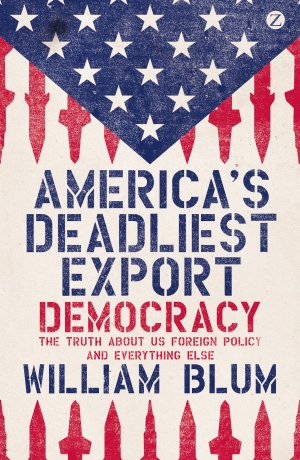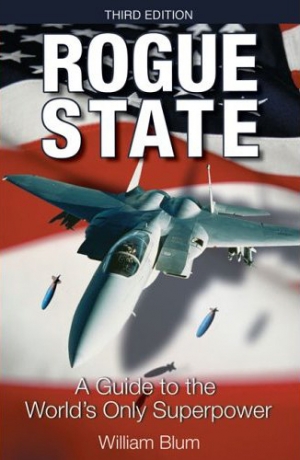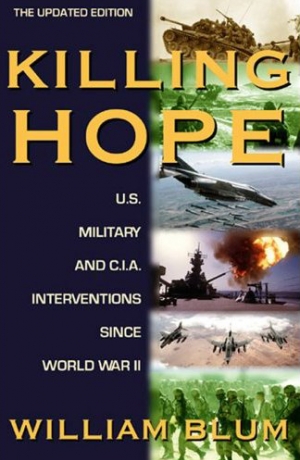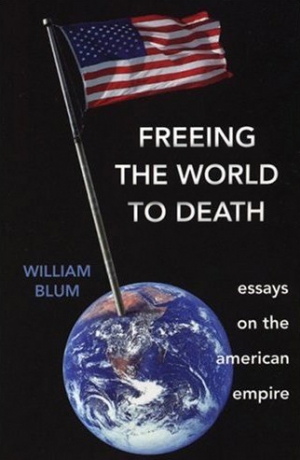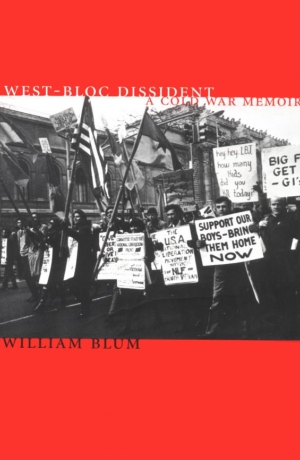The Anti-Empire Report #117
By William Blum – Published June 4th, 2013
What our presidents tell our young people
In this season of college graduations, let us pause to remember the stirring words of America’s beloved scholar, George W. Bush, speaking in Florida in 2007 at the commencement exercises of Miami Dade College: “In Havana and other Cuban cities, there are people just like you who are attending school, and dreaming of a better life. Unfortunately those dreams are stifled by a cruel dictatorship that denies all freedom in the name of a dark and discredited ideology.” 1
How I wish I had been in the audience. I would have stood up and shouted: “In Cuba all education is completely free. But most of the young people sitting here today will be chained to a large, crippling debt for much of the rest of their life!”
As the security guards came for me I’d yell: “And no one in Cuba is forced to join the military to qualify for college financial aid, like Bradley Manning was forced!”
As they grabbed me I’d manage to add: “And Congress has even passed a law prohibiting students from declaring bankruptcy to get rid of their debt!”
And as I was being dragged away, with an arm around my neck, I’d squeeze out my last words: “Do you know that $36 billion in student debt belongs to Americans who are 60 or older? … (choke, gasp) … and that students have committed suicide because of their debt?”
I don’t know if Professor Bush would have found any words within his intellect to respond with, but the last words I’d hear from the students, as the handcuffs were being tightened, would be: “If you don’t like it here, why dontya move to Cuba?”
Bad enough they have to pay highway-robbery tuition, but they wind up brainwashed anyhow.
Let us now turn to the current president. Here he is at the May 19 graduation ceremony at Morehouse College in Atlanta, Martin Luther King’s alma mater:
I know that when I am on my deathbed someday, I will not be thinking about any particular legislation I passed; I will not be thinking about a policy I promoted; I will not be thinking about the speech I gave, I will not be thinking the Nobel Prize I received. I will be thinking about that walk I took with my daughters. I’ll be thinking about a lazy afternoon with my wife. I’ll be thinking about sitting around the dinner table and seeing them happy and healthy and knowing that they were loved. And I’ll be thinking about whether I did right by all of them.
And I, like Woody Allen’s Zelig, would have shown up at this graduation as well, and I would have shouted out: “What about the family sitting happy and healthy around the dinner table in Pakistan or Afghanistan, and a missile – your missile – comes screaming through the roof, reducing the precious family to bones and blood and dust. What about the nice happy and healthy families in Yemen and Iraq and Somalia and Libya whom you’ve droned and missiled to death? Why haven’t you returned the Nobel Prize? In case you’ve forgotten, it was a PEACE prize!”
Oh, that taser does hurt! Please contribute to my bail fund.
Pipelineistan
I have written on more than one occasion about the value of preaching and repeating to the choir on a regular basis. One of my readers agreed with this, saying: “How else has Christianity survived 2,000 years except by weekly reinforcement?”
Well, dear choir, beloved parishioners, for this week’s sermon we once again turn to Afghanistan. As US officials often make statements giving the impression that the American military presence in that sad land is definitely winding down – soon to be all gone except for the standard few thousand American servicemen which almost every country in the world needs stationed on their territory – one regularly sees articles in the mainstream media and government releases trying to explain what it was all about. For what good reason did thousands of young Americans breathe their last breath in that backward country and why were tens of thousands of Afghans dispatched by the United States to go meet Allah (amidst widespread American torture and other violations of human rights)?
The Washington Post recently cited a Defense Department report that states: The United States “has wound up with a reasonable ‘Plan B’ for achieving its core objective of preventing Afghanistan from once again becoming a safe haven for al-Qaeda and its affiliates.”
“Preventing a safe haven for terrorists” – that was the original reason given back in 2001 for the invasion of Afghanistan, a consistency in sharp contrast to the ever-changing explanations for Iraq. However, it appears that the best and the brightest in our government and media do not remember, if they ever knew, that Afghanistan was not really about 9-11 or fighting terrorists (except the many the US has created by its invasion and occupation), but was about pipelines.
President Obama declared in August 2009: “But we must never forget this is not a war of choice. This is a war of necessity. Those who attacked America on 9/11 are plotting to do so again. If left unchecked, the Taliban insurgency will mean an even larger safe haven from which al Qaeda would plot to kill more Americans.” 2
Never mind that out of the tens of thousands of people the United States and its NATO front have killed in Afghanistan not one has been identified as having had anything to do with the events of September 11, 2001.
Never mind – even accepting the official version of 9/11 – that the “plotting to attack America” in 2001 was devised in Germany and Spain and the United States more than in Afghanistan. Why didn’t the United States bomb those countries?
Indeed, what actually was needed to plot to buy airline tickets and take flying lessons in the United States? A room with a table and some chairs? What does “an even larger safe haven” mean? A larger room with more chairs? Perhaps a blackboard? Terrorists intent upon attacking the United States can meet almost anywhere. At the present time there are anti-American terrorist types meeting in Libya, Syria, Turkey, Pakistan, Qatar, Saudi Arabia, London, Paris, and many other places. And the Taliban of Afghanistan would not be particularly anti-American if the United States had not invaded and occupied their country. The Taliban are a diverse grouping of Afghan insurgents whom the US military has come to label with a single name; they are not primarily international jihadists like al-Qaeda and in fact have had an up-and-down relationship with the latter.
The only “necessity” that drew the United States to Afghanistan was the desire to establish a military presence in this land that is next door to the Caspian Sea region of Central Asia – reportedly containing the second largest proven reserves of petroleum and natural gas in the world – and build oil and gas pipelines from that region running through Afghanistan.
Afghanistan is well situated for such pipelines to serve much of South Asia and even parts of Europe, pipelines that – crucially – can bypass Washington’s bêtes noire, Iran and Russia. If only the Taliban would not attack the lines. Here’s Richard Boucher, US Assistant Secretary of State for South and Central Asian Affairs, in 2007: “One of our goals is to stabilize Afghanistan, so it can become a conduit and a hub between South and Central Asia so that energy can flow to the south.” 3
Since the 1980s all kinds of pipelines have been planned for the area, only to be delayed or canceled by one military, financial or political problem or another. For example, the so-called TAPI pipeline (Turkmenistan-Afghanistan-Pakistan-India) had strong support from Washington, which was eager to block a competing pipeline that would bring gas to Pakistan and India from Iran. TAPI goes back to the late 1990s, when the Taliban government held talks with the California-based oil company Unocal Corporation. These talks were conducted with the full knowledge of the Clinton administration, and were undeterred by the extreme repression of Taliban society. Taliban officials even made trips to the United States for discussions. 4
Testifying before the House Subcommittee on Asia and the Pacific on February 12, 1998, Unocal representative John Maresca discussed the importance of the pipeline project and the increasing difficulties in dealing with the Taliban:
The region’s total oil reserves may well reach more than 60 billion barrels of oil. Some estimates are as high as 200 billion barrels … From the outset, we have made it clear that construction of the pipeline we have proposed across Afghanistan could not begin until a recognized government is in place that has the confidence of governments, leaders, and our company.
When those talks with the Taliban stalled in 2001, the Bush administration reportedly threatened the Taliban with military reprisals if the Afghan government did not go along with American demands. On August 2 in Islamabad, US State Department negotiator Christine Rocca reiterated to the Taliban ambassador to Pakistan, Abdul Salam Zaeef: “Either you accept our offer of a carpet of gold [oil], or we bury you under a carpet of bombs.” 5 The talks finally broke down for good a month before 9-11.
The United States has been serious indeed about the Caspian Sea and Persian Gulf oil and gas areas. Through one war or another beginning with the Gulf War of 1990-1, the US has managed to establish military bases in Saudi Arabia, Kuwait, Bahrain, Qatar, Oman, Afghanistan, Pakistan, Uzbekistan, Tajikistan, Kyrgyzstan, and Kazakhstan.
The war against the Taliban can’t be “won” short of killing everyone in Afghanistan. The United States may well try again to negotiate some form of pipeline security with the Taliban, then get out, and declare “victory”. Barack Obama can surely deliver an eloquent victory speech from his teleprompter. It might even include the words “freedom” and “democracy”, but certainly not “pipeline”.
“We are literally backing the same people in Syria that we are fighting in Afghanistan and that have just killed our ambassador in Libya! We must finally abandon the interventionist impulse before it is too late.” – Congressman Ron Paul, September 16, 2012 6
How it all began: “To watch the courageous Afghan freedom fighters battle modern arsenals with simple hand-held weapons is an inspiration to those who love freedom. Their courage teaches us a great lesson – that there are things in this world worth defending. To the Afghan people, I say on behalf of all Americans that we admire your heroism, your devotion to freedom, and your relentless struggle against your oppressors.” – President Ronald Reagan, March 21, 1983
A Modest Proposal
Washington’s sanctions against Iran are a wonder to behold, seriously hampering Tehran’s ability to conduct international commerce, make payments, receive money, import, export, invest, travel … you name the hardship and the United States is trying to impose it on the government and the people of Iran. In early May a bipartisan bill was introduced in Congress aimed at stopping Iran from gaining access to its billions of dollars in euros kept in overseas banks – money that represents up to a third of Tehran’s total hard-currency holdings. In addition, Congress is looking to crack down on a weakness in current sanctions law that allows Iran to replenish its hard-currency accounts by acquiring gold through overseas markets.
Washington has as well closed down Iran’s media operations in the United States, is putting great pressure on Pakistan to cancel their project to build a pipeline to import natural gas from Iran, and punished countless international companies for doing business with Iran.
After a plane crash in Iran in 2011, the Washington Post reported: “Plane crashes are common in Iran, which for decades has been prevented from buying spare parts for its aging fleet by sanctions imposed by the United States.” 7
There are many more examples of the sanctions of mass destruction.
All this to force Iran to abandon any program that might conceivably lead someday to a nuclear weapon, thus depriving Israel of being the only nuclear power in the Middle East. The United States doesn’t actually say this. It instead says, explicitly or implicitly, that a nuclear Iran would be a danger to attack the US or Israel, without giving any reason why Iran would act so suicidal; at the same time Washington ignores repeated statements from various Israeli and American officials that they have no such fear.
Now, a group of US lawmakers is proposing a more drastic remedy: cutting off Iran entirely from world oil markets. Oil sales provide Iran with the bulk of its foreign-currency earnings. The plan would require all countries to stop buying oil from Iran or risk losing access to the US banking system. 8
And Iran ignores it all, refusing to bend. Islamic fanatics they are.
I have a much simpler solution. Why not cut off all exports of food to Iran? Worldwide. And anything that goes into producing food – seed, fertilizer, farm equipment, etc. Let’s see how good they are at ignoring it when their children’s bellies start to balloon. And medicines and medical equipment as well! Let’s see how good they are at producing whatever they need themselves.
Officials at The United Nations Children’s Fund (UNICEF) estimated that as many as 6,000 Iraqi children died each month in the early 1990s primarily due to the sanctions imposed by the US, the UK and others. As proof of the lasting effectiveness and goodness of that policy, today blessed peace reigns in Iraq among its citizens.
And if all else fails with Iran … Nuke the bastards! That may be the only way they’ll learn what a horrible weapon a nuclear bomb is, a weapon they shouldn’t be playing around with.
In recent times Iraq, Libya, Syria and Iran have been the prime forces standing in the way of USraeli Middle East domination. Thus it was that Iraq was made into a psychotic basket case. Libya’s welfare state was wiped out and fundamentalists have imposed Islamic law on much of the country. The basketizing of Syria is currently in process. Iran’s basketizing has begun with draconian sanctions, the way the basketizing of Iraq began.
It’s worth noting that Iraq, Syria, and Libya were the leading secular states of the Middle East. History may not treat kindly the impoverishment and loss of freedoms that the US-NATO-European Union Triumvirate has brought down upon the heads of the people of these lands.
What are we going to do about our sociopathic corporations?
Scarcely a day goes by in the United States without a news story about serious ethical/criminal misbehavior by a bank or stock brokerage or credit-rating agency or insurance agency or derivatives firm or some other parasitic financial institution. Most of these firms produce no goods or services useful to human beings, but spend their days engaged in the manipulation of money, credit and markets, employing dozens of kinds of speculation.
Consider the jail time served for civil disobedience by environmental, justice and anti-war activists, in contrast to the lifestyle enjoyed by the wicked ones who crashed the financial system and continue to fund the wounding of our bleeding planet.
The federal and state governments threaten to sue the financial institutions. Sometimes they actually do sue them. And a penalty is paid. And then the next scandal pops up. And another penalty is paid. And so it goes.
Picture this: A fleet of police cars pulls up in front of Bank of America’s Corporate Center in Charlotte, North Carolina. A dozen police officers get out, enter the building, and take the elevator to the offices of the bank’s top executives. Minutes later the president and two vice-presidents – their arms tightly bound in handcuffs behind their back – are paraded through the building in full view of their employees who stare wide-eyed and open-mouthed. The sidewalk is of course fully occupied by the media as the police encircle the building with tape saying “No tresspassing. Crime scene.”.
But remember, just because America has been taken over by mendacious mass-murdering madmen doesn’t mean we can’t have a good time.
Notes
- Washington Post, April 29, 2007
- Talk given by the president at Veterans of Foreign Wars convention, August 17, 2009
- Talk at the Paul H. Nitze School for Advanced International Studies, Washington, DC, September 20, 2007
- See, for example, the December 17, 1997 article in the British newspaper, The Telegraph, “Oil barons court Taliban in Texas”.
- Pepe Escobar, Asia Times, September 12, 2012 (Information Clearing House)
- The Hill, daily congressional newspaper, Washington, DC
- Washington Post, January 10, 2011
- Washington Post, May 13, 2013
Any part of this report may be disseminated without permission, provided attribution to William Blum as author and a link to williamblum.org is provided.
